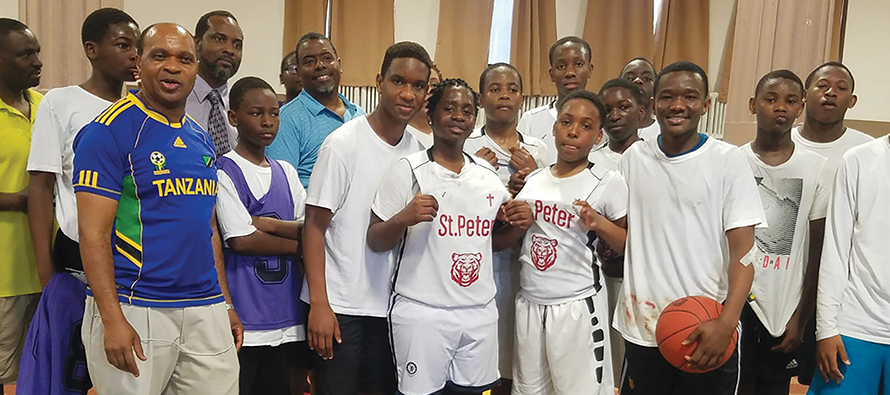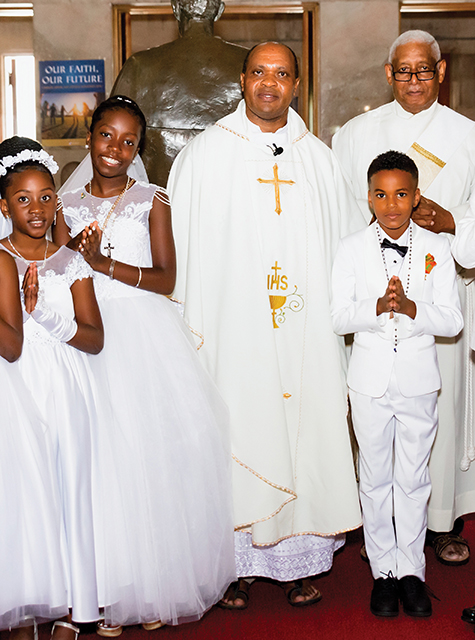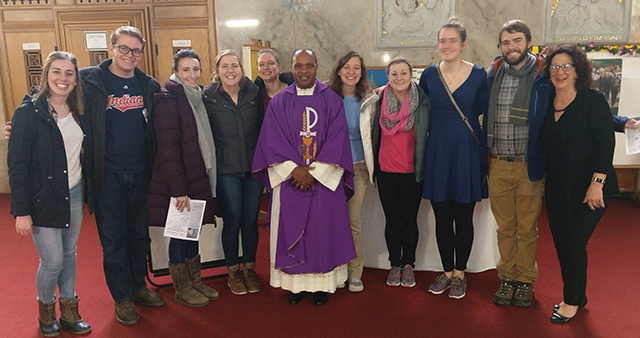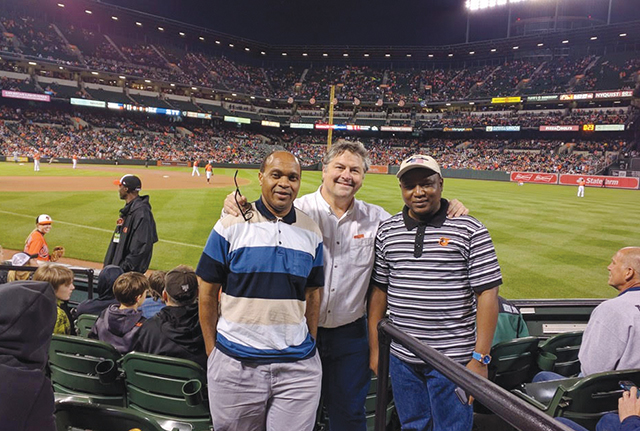Man with a mission

Father Honest Munishi, C.S.Sp. with youth during a basketball competition at St. Edward Parish in Baltimore. To connect with young people, Munishi has been known to don sports attire and join them on the playing field.
LIKE PASTORS everywhere, Father Honest Munishi, C.S.Sp. had to get creative. He was finding it tricky to organize young people at his parish in Baltimore. But he had a shrewd idea. “We are going to play soccer,” he declared one day. “That is where we started the youth program: on the soccer field, not in the classroom. From there, I brought in the youth minister to explain the faith—only after playing soccer, sitting down, maybe sharing some food together.”
And you better believe he was playing, too. “I had my shorts and T-shirt, and I was playing with them. Every game, I was there. Maybe sometimes I wasn’t playing very well, but they laugh at me, and that’s part of the game.”
As a missionary priest, Munishi has had many experiences of learning how to play whatever game the locals play. He belongs to the Spiritans, also called the Congregation of the Holy Spirit. His current post in Houston is a long way from his childhood home in the Kilimanjaro region of Tanzania.
A first place of ministry
Back in Tanzania, Mount Kilimanjaro rises almost 20,000 feet above sea level as the highest freestanding mountain in the world and the tallest summit in Africa. On its southern edge sits the town of Moshi and the village of Kibosho. Years ago, there you would have found a young Honest Munishi, growing up with his 10 siblings and mom and dad—and all the people of his village. “Every parent in my village is the parent of all children,” Munishi recalls.

This region of Tanzania is known for its large Catholic population. “My parents and siblings and I are all practicing Catholics. We would pray every day, in the morning and the evening, and then have Rosary together before we go to sleep. And we would go to Mass every Sunday—you could not miss Mass!” Munishi laughs.
And his home village was really his first place of ministry. “Neighborhood youth would organize ourselves to have centers for prayer, so people could pray together. We would gather to pray things like the Rosary—together,” he said.
This communal, local experience of the church seeded his vocation to religious life and priesthood. Munishi remembers his First Communion at age 11 as a major event. “Then, my mom would take me to Adoration and Benediction, and from there, it clicked. I felt like I wanted to become a priest. I developed an interest in serving Mass, so I joined the altar servers society in my parish. I developed an interest in going to Mass every day before I went to school. I ended up serving for over seven years, and when I was finishing primary school, I applied to minor seminary,” Munishi says. (A minor seminary is a secondary school for young men considering the priesthood.)
A sense of the larger world
He completed a mandatory year of national service and—with a continuing desire to be a priest—Munishi went off to a college-level seminary. His experiences had already begun to shape him, molding the village boy into someone with a growing sense of the bigger world and his place in it.
“When I went to minor seminary, I encountered many other students from different areas of Tanzania. I came to know that the way they do things in other areas was not the way I did things at home. It showed me what was happening outside my own region, my own culture, and my own family. And that’s why I wanted to be a missionary,” Munishi said.
During his studies, Munishi faced a challenging crossroads: His father died, leaving his mother a widow. Culturally, he knew his responsibility as the firstborn son was to return home to support and care for his mother and siblings. When he shared this with his mother, in a way, her generosity sent him out as a missionary before he was formally made one. “My mother lovingly told me, ‘You are carrying nothing on your shoulders. I am carrying it for you. It is me. Go back to the seminary!’” In other words, she felt her vocation was to support their family and his vocation remained priesthood.

Finding a match
With priesthood and the possibility of missionary work on his mind, eventually Munishi found a match in the Spiritans, a missionary congregation that runs a major seminary in Tanzania. After studies and ordination, Munishi was assigned to parish ministry in Zimbabwe, where he served for seven years. He rounded out his first decade with additional ministry in Tanzania when a new opportunity arose.
1. Life and Dignity of the Human Person
Human life is sacred and the dignity of the human person is foundational to a moral vision. The measure of every institution is whether it threatens or enhances the life and dignity of the human person.
2. Family, Community, and Participation
The person is not only sacred but also social. How we organize our society—in economics, politics, law, and policy—directly affects human dignity and the capacity of individuals to grow in community. People have a right and a duty to participate in society and seek the common good of all.
3. Rights and Responsibilities
Every person has a fundamental right to life and a right to those things required for human decency and corresponding duties and responsibilities to one another.
4. Option for the Poor and Vulnerable
A basic moral test is how our most vulnerable members are faring. We must put the needs of the poor and vulnerable first.
5. Dignity of Work and Rights of Workers
The economy must serve people, not the other way around. Basic rights of workers must be respected, including decent work, fair and liveable wages, and ability to unionize.
6. Solidarity
We are one human family whatever our national, racial, ethnic, economic, and ideological differences. We are our brother’s and sister’s keepers. We must pursue justice and peace together.
7. Care for God’s Creation
We show our respect for the Creator by our stewardship of creation. We are called to protect people and the planet, living our faith in relationship with all of God’s creation. Environmental challenges have moral and ethical dimensions.
Learn more at usccb.org
“My provincial in Tanzania approached me and asked, ‘What do you think? The U.S. province is looking for someone.’ I took time to respond. So he asked again, and then a third time, and I said, ‘OK, I think I will go.’ And the first place I landed was in the Diocese of Little Rock, in a parish.”
Munishi wondered how well Americans would understand his accent, and he had some struggles acclimating to the culture. “For example, back home, I cannot call my mom or other mothers by their names—I call them ‘Mom.’ In Arkansas, I would call a woman ‘Mom,’ and she might say, ‘I’m not your mom.’ I would tell them that back home calling a mother by her name could be disrespectful. So, slowly, slowly, they came to understand, especially the older ones, who saw me more as a son,” he explains.
He also learned about ministering somewhere that was not as Catholic as his home region in Tanzania. His smaller U.S. congregations shocked him, “and the length of Mass was strange for me—to say Mass for only an hour!”
Missionaries, by the very nature of what they do, must frequently adjust themselves to new cultures and realities. “Slowly, I learned how to adapt, how to accept things, and how to be flexible. And with the help of the priest I was working with, and the time and training my congregation gave me to adapt, I grew into becoming a pastor. In the United States, we have more—the facilities, the system, the organization here is excellent compared to Tanzania. I brought in the idea to appreciate all we have and learn to share with others,” he says.
Modeling missionary ministry
After Arkansas, his community asked him to serve in a predominantly black parish in Baltimore. “At the beginning, I had challenges because I was bringing the ideas and lifestyle I learned in Arkansas, which didn’t work very well. The spirituality of the black community parish is different from that of a mixed or mainly white community.”
Now, several years later, he is serving as a vocation director in Houston, hoping that young people will see a little of missionary ministry and community life and consider it for themselves. “I want young people to pray about this, to share this with their parents, to develop a deep and personal relationship with God,” he says. “In that way, a young person will hear the voice of God and find the place where God is pointing him or her. Invite God into your life, and you will discover God. Attune to the simple, profound, clear voice of Jesus.”
The voice of God, it seems, is what has kept Munishi moving forward into many unknowns, from his rural boyhood near Mount Kilimanjaro to the bayous and oil refineries of Houston. As with any priest—or any Christian—life comes back to following Christ.

Related article: VocationNetwork.org, “5 reasons I love being a missionary priest.”
Tags
- missionaries
- missionary priest
- tanzania
- father honest munishi cssp
- spiritans
- congregation of the holy spirit
Related
- Taking a chance on God: Profile of Father David Gutierrez, C.M.F.
- About-face to the priesthood
- Moved by the power of the Eucharist: Profile of Father Duy Henry Bui Nguyen, S.C.J.
- No regrets: A grateful priest takes stock
- We’re different—in a good way: Profile of Father Roberto Mejia, O.Carm.
- Monastic life is habit-forming
- Ministering to migrants in a carport cathedral
- Connections make the man: Profile of Father Kevin Zubel, C.Ss.R.
- A priest (who’s been there) responds to the pain of addiction
- In search of healing, one story at a time Read More
Most Viewed
- Find your spirituality type quiz
- Questions and answers about religious vocations
- Celibacy quiz: Could I be a nun? Could I be a brother? Could I be a priest?
- Resources for older discerners or those with physical and developmental differences
- About Vocation Network and VISION Guide


